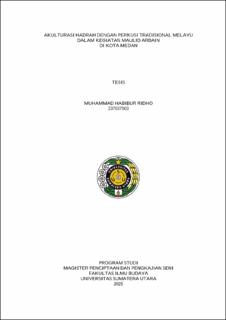| dc.description.abstract | Acculturation in music is a form of intercultural encounter that gives birth to new
expressions in the practice of performing arts. Hadrah as a form of religious music
not only functions as a medium of da'wah, but also becomes a creative space that is
open to the influence of local culture. In urban societies such as Medan City, cultural
exchanges often occur through collective religious practices. Religious activities
such as Maulid Arbain are social spaces that allow the mixing of cultural elements,
including in the form of musicals. In the context of Maulid Arbain's activities in the
city of Medan, Hadrah experienced an interesting musical interaction with elements
of traditional Malay percussion. The main purpose of this study is to identify the
form of Hadrah performance in Maulid Arbain activities, analyze the Hadrah
playing technique that is acculturated with traditional Malay music, and examine the
acculturation process thoroughly. The descriptive qualitative approach is used with
data collection techniques through observation, interviews, and documentation, and
is analyzed based on acculturation theory. The object of study was focused on the
performance of Hadrah in Maulid Arbain activities at the Darul Ibtihaj Islamic
Boarding School, Medan City. The results of the study show that there is an
acculturation process between Hadrah and traditional Malay percussion music. This
can be seen in the similarity of musical instruments such as tambourine and marwas
to Malay drums. Acculturation is also reflected in interlocking-based game
techniques that combine Hadrah rhythmic patterns with the peculiarities of Malay
rhythms. In addition, the involvement of participants from various backgrounds, such
as entrepreneurs, students, and Malay percussion music practitioners who study
Hadrah, shows that this acculturation process also forms a dynamic and inclusive
space for cultural interaction in the community. | en_US |


